John Holloway (born 1947) is an Irish lawyer, sociologist and philosopher whose early work in the 1970s focussed mainly on Marxist economics. Since 1991, he has been closely associated with the Zapatist@s in Chiapas, Mexico, who are working to build a libertarian form of grassroots government.
Quote Category: Authority and Democracy
Today, democracy is a very prevalent way of organising society, which in theory guarantees the power of the people, their equality and right to participation. Authority, by contrast, is understood as an asymmetric social relationship. According to the sociologist Max Weber, unlike power, authority has a certain legitimacy (e.g. the recognition of rule by the ruled, a belief in its legitimacy). Throughout human history, societies have been shaped by a wide variety of organisational forms which have been subject to ongoing change through processes such as wars, revolutions and uprisings. Social movements have been fighting for greater equality, justice and participation for centuries. In the timeline on democracy, authority, power and participation, we explore the following questions:
*What different ways of organising society have existed over the course of history?
*What advantages and disadvantages did they offer, and for whom?
*What power relations shaped them?
*How were and are other power relations interwoven with authority?
*What kinds of resistance to authoritarian rule have existed in history?
*What alternative forms of organising society existed in the past, and exist today?
Unfortunately wrong answer
Try again!
The answer was
Read the solution on the "line with the dots" (there where you can re-read all the quotes)
OK
We are all in a room with four walls (…) The room is furnished and some of us are sitting comfortably, others most definitely are not. The walls are advancing inwards gradually, sometimes slower, sometimes faster, making us all more uncomfortable (…) From time to time there are elections about how to place the furniture. These elections are not unimportant: they make some people more comfortable, others less so; they may even affect the speed at which the walls are moving, but they do nothing to stop their relentless advance.
Correct!
We are all in a room with four walls (…) The room is furnished and some of us are sitting comfortably, others most definitely are not. The walls are advancing inwards gradually, sometimes slower, sometimes faster, making us all more uncomfortable (…) From time to time there are elections about how to place the furniture. These elections are not unimportant: they make some people more comfortable, others less so; they may even affect the speed at which the walls are moving, but they do nothing to stop their relentless advance.
Year:
Author Bio:
Source:
John Holloway (2010: 8).
Context:
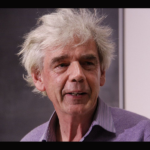 Many viewed the collapse of the Soviet Union and other so-called socialist states as representing the disappearance of an alternative model of society. At the end of the 1980s, the West proclaimed what US political scientist Francis Fukuyama, writing in 1989, termed the ‘end of history’. Thus Western representative democracy, coupled with a market economy, was promoted as the only legitimate and imaginable form of society left. Within this framework there are, as Holloway puts it in this quote, different forms. None of these, however, question capitalism and representative democracy’s overall structure.
Many viewed the collapse of the Soviet Union and other so-called socialist states as representing the disappearance of an alternative model of society. At the end of the 1980s, the West proclaimed what US political scientist Francis Fukuyama, writing in 1989, termed the ‘end of history’. Thus Western representative democracy, coupled with a market economy, was promoted as the only legitimate and imaginable form of society left. Within this framework there are, as Holloway puts it in this quote, different forms. None of these, however, question capitalism and representative democracy’s overall structure.
Further Reading:
*John Holloway (2010): Crack Capitalism. London & New York: Pluto Press.
OK
1. Men are born and remain free and equal in rights. Social distinctions may be based only on considerations of the common good. 2. The aim of every political association is the preservation of the natural and imprescriptible rights of Man. These rights are Liberty, Property, Safety and Resistance to Oppression. 3. The principle of any Sovereignty lies primarily in the Nation. No corporate body, no individual may exercise any authority that does not expressly emanate from it. 4. Liberty consists in being able to do anything that does not harm others.
Correct!
1. Men are born and remain free and equal in rights. Social distinctions may be based only on considerations of the common good. 2. The aim of every political association is the preservation of the natural and imprescriptible rights of Man. These rights are Liberty, Property, Safety and Resistance to Oppression. 3. The principle of any Sovereignty lies primarily in the Nation. No corporate body, no individual may exercise any authority that does not expressly emanate from it. 4. Liberty consists in being able to do anything that does not harm others.
Year:
Author Bio:
The Declaration of the Rights of Man and of the Citizen (Déclaration des Droits de l’Homme et du Citoyen) is one of the fundamental texts of the French Revolution.
Source:
Context:
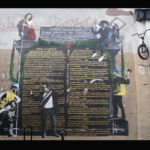 The French Revolution’s motto was liberté, egalité, fraternité (liberty, equality, fraternity). It abolished the absolutist monarchy (Louis XIV: ‘I am the state’) and established a new system of rule. Feudal power structures were replaced with governance by the majority population and the royal family was executed. The revolution is seen as one of the Enlightenment’s decisive events, and its importance extends to how it addressed human rights, democracy and forms of government. However, the period of revolutionary terror, which sent all perceived enemies of the revolution within France to the guillotine, is usually judged critically. For example, Olympe de Gouges was executed in 1793 when she demanded universal human rights for women as well as men. In 1799, General Napoléon Bonaparte assumed the rank of First Consul of the republic, asserting absolute dictatorial power, which he later confirmed by declaring himself Emperor. At the same time, France had colonies. In fact, in the 19th century, it was the second largest colonial power in the world. Neither equality nor inalienable human rights applied to these areas.
The French Revolution’s motto was liberté, egalité, fraternité (liberty, equality, fraternity). It abolished the absolutist monarchy (Louis XIV: ‘I am the state’) and established a new system of rule. Feudal power structures were replaced with governance by the majority population and the royal family was executed. The revolution is seen as one of the Enlightenment’s decisive events, and its importance extends to how it addressed human rights, democracy and forms of government. However, the period of revolutionary terror, which sent all perceived enemies of the revolution within France to the guillotine, is usually judged critically. For example, Olympe de Gouges was executed in 1793 when she demanded universal human rights for women as well as men. In 1799, General Napoléon Bonaparte assumed the rank of First Consul of the republic, asserting absolute dictatorial power, which he later confirmed by declaring himself Emperor. At the same time, France had colonies. In fact, in the 19th century, it was the second largest colonial power in the world. Neither equality nor inalienable human rights applied to these areas.
Further Reading:
*Edmundo Murray (2008): Review of Jean Ziegler’s “La haine de l’Occident”.
OK
After having told the assembled generals his true intentions, to assure forever a stable government for the natives of Haiti, (…) to make the country independent, and to enjoy a liberty consecrated by the blood of the people of this island; and after having gathered their responses, has asked that each of the assembled generals take a vow to forever renounce France, to die rather than live under its domination, and to fight for independence until their last breath.
Correct!
After having told the assembled generals his true intentions, to assure forever a stable government for the natives of Haiti, (…) to make the country independent, and to enjoy a liberty consecrated by the blood of the people of this island; and after having gathered their responses, has asked that each of the assembled generals take a vow to forever renounce France, to die rather than live under its domination, and to fight for independence until their last breath.
Year:
Author Bio:
Supreme General Dessalines and other generals. Jean-Jacques Dessalines (1758-1806) was a former slave and became the supreme general in Haiti’s struggle for independence. He proclaimed himself emperor in 1804 and ruled until 1806. His assassination triggered widespread unrest.
Source:
From the original script of Haiti’s declaration of independence.
Context:
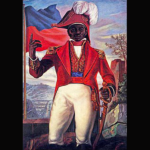 Haitian anti-slavery activists had been fighting for independence from France and against the island’s white elite since 1791. Slavery was abolished in 1794. With the war of independence dragging on for several years, Napoleon (who had effectively returned to power in 1799) threatened to reintroduce slavery. But the Haitians won and, in 1804, became the first Latin American country to become independent. However, a coalition of European states and the United States boycotted the country, which led to its near ruin. Since the prosperity of colonial states was based on the plantation economy and therefore on the principle of slavery, they feared that the Haitian revolution could also inspire other colonised peoples. As a result, Haiti was forced into isolation in terms of foreign policy and the new state was obliged to make vast compensation payments to former slave owners. In return for recognising Haiti as an independent state in 1825, France demanded compensation of 150 million francs, with the sum later reduced to 90 million francs. It was not until 1947 that Haiti was finally able to pay off this amount which it did with the help of loans (Ziegler 2010). The high national debt it was saddled with immediately after independence is often seen as marking the start of Haiti’s economic dependence on the outside world. At the World Conference Against Racism in 2001, Haiti demanded compensation from France.
Haitian anti-slavery activists had been fighting for independence from France and against the island’s white elite since 1791. Slavery was abolished in 1794. With the war of independence dragging on for several years, Napoleon (who had effectively returned to power in 1799) threatened to reintroduce slavery. But the Haitians won and, in 1804, became the first Latin American country to become independent. However, a coalition of European states and the United States boycotted the country, which led to its near ruin. Since the prosperity of colonial states was based on the plantation economy and therefore on the principle of slavery, they feared that the Haitian revolution could also inspire other colonised peoples. As a result, Haiti was forced into isolation in terms of foreign policy and the new state was obliged to make vast compensation payments to former slave owners. In return for recognising Haiti as an independent state in 1825, France demanded compensation of 150 million francs, with the sum later reduced to 90 million francs. It was not until 1947 that Haiti was finally able to pay off this amount which it did with the help of loans (Ziegler 2010). The high national debt it was saddled with immediately after independence is often seen as marking the start of Haiti’s economic dependence on the outside world. At the World Conference Against Racism in 2001, Haiti demanded compensation from France.
Further Reading:
*Project in Haiti and the Dominican Republic, where youths work on history of enslavement.
*C.L.R. James (1963): The Black Jacobins. New York: Random House.
OK
The following are essential purposes and functions of the State, in addition to those established in the Constitution and the law: 1. To construct a just and harmonious society, built on decolonisation, without discrimination or exploitation, with full social justice, in order to strengthen the Pluri-National identities.
Correct!
The following are essential purposes and functions of the State, in addition to those established in the Constitution and the law: 1. To construct a just and harmonious society, built on decolonisation, without discrimination or exploitation, with full social justice, in order to strengthen the Pluri-National identities.
Year:
Author Bio:
The Bolivian constitution was drafted after the 2006 election of Bolivia’s first indigenous president, Evo Morales.
Source:
Article 9, 1 of the Bolivian Constitution.
Context:
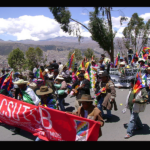 The experience of colonial subjugation impacts identities in Bolivia to this day. Long after the formal end of colonial rule in 1825, asymmetrical power relations in terms of race, gender and class still prevail. However, there is now a (vice) ministry for decolonisation (including a director for de-patriachalisation), and a centre for the rehabilitation of the country’s indigenous majority after 500 years of colonial rule. In 2020, Silvia Lazarte was appointed the first indigenous woman President of the Constitutional Assembly (laestrella.com, 30.06.2020).
The experience of colonial subjugation impacts identities in Bolivia to this day. Long after the formal end of colonial rule in 1825, asymmetrical power relations in terms of race, gender and class still prevail. However, there is now a (vice) ministry for decolonisation (including a director for de-patriachalisation), and a centre for the rehabilitation of the country’s indigenous majority after 500 years of colonial rule. In 2020, Silvia Lazarte was appointed the first indigenous woman President of the Constitutional Assembly (laestrella.com, 30.06.2020).
Further Reading:
*Interview with Elisa Vega Sillo (2015): Decolonizing Bolivia’s History of Indigenous Resistance.
*Decolonizing Bolivian Education (2010): A Critical Look at the Plurinational State’s Vision.
OK
We live under a form of government which does not emulate the institutions of our neighbours; on the contrary we ourselves are the model, which some follow, rather than the imitators of other peoples. Our government is called a democracy because its administration is in the hands not of the few but of the majority.
Correct!
We live under a form of government which does not emulate the institutions of our neighbours; on the contrary we ourselves are the model, which some follow, rather than the imitators of other peoples. Our government is called a democracy because its administration is in the hands not of the few but of the majority.
Year:
Author Bio:
Pericles (ca. 495 – 429 BC) was an Athenian general and politician.
Source:
Dr. Fani Mallouchou-Tufano (2006): “The Restoration of the Athenian Acropolis.” Lecture at LSA.
Context:
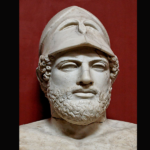 Athenian democracy is often seen as the basis of contemporary Western democracy. Within it, a significant part of the population took part in certain types of voting. However, women and enslaved people were excluded from voting, and Pericles is also credited with saying ‘The best woman is the one who speaks the least.’ The city-state of Athens had numerous colonies in the Mediterranean and along the Black Sea’s coasts. The so-called Great Colonisation took place mainly from the mid 8th to the mid 6th centuries B.C.E. Initially Greek traders settled, and they were then followed by others, while existing populations were expelled. During the debt crisis of 2009, the situation in Greece was described as post-colonial, because Greek domestic policy was externally determined (by the troika of the IMF, European Commission and Central Bank, Samaddar 2015).
Athenian democracy is often seen as the basis of contemporary Western democracy. Within it, a significant part of the population took part in certain types of voting. However, women and enslaved people were excluded from voting, and Pericles is also credited with saying ‘The best woman is the one who speaks the least.’ The city-state of Athens had numerous colonies in the Mediterranean and along the Black Sea’s coasts. The so-called Great Colonisation took place mainly from the mid 8th to the mid 6th centuries B.C.E. Initially Greek traders settled, and they were then followed by others, while existing populations were expelled. During the debt crisis of 2009, the situation in Greece was described as post-colonial, because Greek domestic policy was externally determined (by the troika of the IMF, European Commission and Central Bank, Samaddar 2015).
Further Reading:
*Ranabir Samaddar (2015): “The Postcolonial Bind of Greece.” Viewpointmag.
OK
Because I had made peace with him, I was sleeping, oblivious, when he came and shot me awake.
Correct!
Because I had made peace with him, I was sleeping, oblivious, when he came and shot me awake.
Year:
Author Bio:
Hendrik Witbooi (ca. 1830-1905) about Curt von François, officer of the German Protection Force in today’s Namibia, the former German colony. Witbooi, actually ǃNanseb ǀGabemab, was from the end of 1888 the captain of the Orlam people, the Witbooi, who were related to the Nama.
Source:
Annemarie Heywood, Eben Maasdorp & Brigitte Lau (Hrsg., 1996): The Hendrik Witbooi papers. Windhoek: National Archives of Namibia. p. 151. The year (1893) is an approximation.
Context:
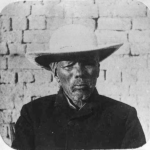 The Roman strategy of divide and rule was used by the Germans in Namibia to ensure that they would not confront a united anti-colonial army.
The Roman strategy of divide and rule was used by the Germans in Namibia to ensure that they would not confront a united anti-colonial army.
The Witbooi family led the Nama in the resistance against German colonial power. The Nama were attacked by the Germans in 1893 in what became known as the Hornkranz Massacre. During it, most of the women and children were slaughtered, while male warriors escaped. Henrik Witbooi, Moose’s son, then led a guerrilla war. After several attempts, which the exchange of letters also bears witness to, from 1904 onwards, the Herero and Nama united their resistance. Defeated by the colonial power, they were interned in camps where most of the remaining Nama and Herero perished. Overall, it is estimated that between 1904 and 1908, up to 70,000 Nama and Herero died in what was the 20th century’s first genocide (Jorgensen & Markusen 1999: 288).
Further Reading:
*Reinhard Koesseler (2007): Genocide, Apology and Reparation –the linkage between images of the past in Namibia and Germany.
*Torben Jorgensen & Eric Markusen (1999): The Genocide of the Hereros. In: Israel W. Charny (Hrsg.): Encyclopedia of Genocide. Band 1, S. 288.
OK
We wanted lasting peace, true democracy and justice. But after only a few months we had to realise that our hopes had not been fulfilled. Therefore we returned to the mountains to continue the struggle for the liberation of our country.
Correct!
We wanted lasting peace, true democracy and justice. But after only a few months we had to realise that our hopes had not been fulfilled. Therefore we returned to the mountains to continue the struggle for the liberation of our country.
Year:
Author Bio:
Remedios Gomez-Paraiso (1919-2014) was a commander of the anti-Japanese Hukbalahap People’s Liberation Army in the Philippines during World War II. Here about the “liberation” and reoccupation of the Philippines by the USA in 1944.
Source:
Rheinisches JournalistInnenbüro & Recherche International e.V. (2008): 100f.
Context:
 The Philippines was a Spanish colony from 1571 until, as an outcome of anti-colonial liberation struggle, it declared independence in 1898. However, its independence was not recognised, and in the ensuing Philippine-American War of 1899 to 1902, a fifth of the population lost their lives. The islands then became a US colony until 1942 when they were occupied by Japanese troops. The Anti-Japanese People’s Liberation Army was the largest resistance movement in the Philippines and consisted of 30,000 fighters and 70,000 reservists. They collaborated with the US against the Japanese, but were a left-wing partisan group opposed to US colonial rule. According to writer Ricardo Trota Jose, 80% of Filipinos were either in the resistance or supported it ‘One million Filipinos fought in various guerrilla movements. The only problem was: there were not enough weapons. For twenty volunteers who went to the partisans, only one rifle came’ (rjb & ri 2008). The Philippines gained independence in 1946, but a US-friendly government was then installed. It was only in 1990, under President Corazon Aquino, that resistance fighters were finally recognised as such (Rheinisches Journalistenbüro & Recherche International 2008: 100f.).
The Philippines was a Spanish colony from 1571 until, as an outcome of anti-colonial liberation struggle, it declared independence in 1898. However, its independence was not recognised, and in the ensuing Philippine-American War of 1899 to 1902, a fifth of the population lost their lives. The islands then became a US colony until 1942 when they were occupied by Japanese troops. The Anti-Japanese People’s Liberation Army was the largest resistance movement in the Philippines and consisted of 30,000 fighters and 70,000 reservists. They collaborated with the US against the Japanese, but were a left-wing partisan group opposed to US colonial rule. According to writer Ricardo Trota Jose, 80% of Filipinos were either in the resistance or supported it ‘One million Filipinos fought in various guerrilla movements. The only problem was: there were not enough weapons. For twenty volunteers who went to the partisans, only one rifle came’ (rjb & ri 2008). The Philippines gained independence in 1946, but a US-friendly government was then installed. It was only in 1990, under President Corazon Aquino, that resistance fighters were finally recognised as such (Rheinisches Journalistenbüro & Recherche International 2008: 100f.).
Further Reading:
*Rheinisches JournalistInnenbüro & Recherche International e.V. (2008): Die dritte Welt im zweiten Weltkrieg. Unterrichtsmaterialien zu einem vergessenen Kapitel der Geschichte.
OK
I want a capital earning democracy—every man a capitalist. (…) If you’re a man or woman of some independent means, if you’ve got a pride and independence, and so I want the money to go back in their own pockets. Some will spend it (…) on making their home exquisitely beautiful, their garden, their education for their children or giving their children that chance they didn’t have or enable them to learn languages, some looking after their own health, (…) But every man a capitalist, every man a man of property. It induces responsibility in society if you have some of your own.
Correct!
I want a capital earning democracy—every man a capitalist. (…) If you’re a man or woman of some independent means, if you’ve got a pride and independence, and so I want the money to go back in their own pockets. Some will spend it (…) on making their home exquisitely beautiful, their garden, their education for their children or giving their children that chance they didn’t have or enable them to learn languages, some looking after their own health, (…) But every man a capitalist, every man a man of property. It induces responsibility in society if you have some of your own.
Year:
Author Bio:
Margaret Thatcher (1925-2013) was British Conservative Prime Minister from 1979 to 1990. She was nicknamed the Iron Lady because she pushed through her policies to “reform” England against stiff opposition.
Source:
Interview in The Observer, 1. May 1983, p. 37.
Context:
 Thatcher is seen as a symbol of Europe’s turn away from the welfare state and towards the ideologies of individual responsibility and neoliberalism (privatisation, deregulation and the breaking of unions). While Thatcher was Prime Minister in Great Britain, Ronald Reagan was President of the USA (1981-1989). The two are thought of as pioneers of the neoliberalisation of democracy, and in this, they helped forge a global change in politics during the 1980s. Thatcher enforced the logic of necessity with her TINA principle (There is No Alternative), with which severe cuts in social spending etc. continue to be justified to this day. Under Thatcher, the unions were barred from consulting with the government on its labour market policies, many public companies were privatised, and protests against these were crushed. In regards to this, the miners’ strike of 1984/85 is a particularly well known example. She described the disputes surrounding this strike as a prolongation of the Falklands War: ‘We had to fight the enemy without in the Falklands and now we have to fight the enemy within, which is much more difficult but just as dangerous to liberty.’ (quoted in Naomi Klein 2007: 138).
Thatcher is seen as a symbol of Europe’s turn away from the welfare state and towards the ideologies of individual responsibility and neoliberalism (privatisation, deregulation and the breaking of unions). While Thatcher was Prime Minister in Great Britain, Ronald Reagan was President of the USA (1981-1989). The two are thought of as pioneers of the neoliberalisation of democracy, and in this, they helped forge a global change in politics during the 1980s. Thatcher enforced the logic of necessity with her TINA principle (There is No Alternative), with which severe cuts in social spending etc. continue to be justified to this day. Under Thatcher, the unions were barred from consulting with the government on its labour market policies, many public companies were privatised, and protests against these were crushed. In regards to this, the miners’ strike of 1984/85 is a particularly well known example. She described the disputes surrounding this strike as a prolongation of the Falklands War: ‘We had to fight the enemy without in the Falklands and now we have to fight the enemy within, which is much more difficult but just as dangerous to liberty.’ (quoted in Naomi Klein 2007: 138).
Further Reading:
*Naomi Klein (2007): The Shock Doctrine. The Rise of Disaster Capitalism. Toronto: Knopf Canada.
OK
I speak on behalf of the millions of human beings (..) who are reduced to only glimpsing in life a reflection of the lives of the affluent. I speak on behalf of women the world over, who suffer from a male-imposed system of exploitation. … Women who struggle and who proclaim with us that the slave who is not able to take charge of his own revolt deserves no pity for his lot. This harbours illusions in the dubious generosity of a master pretending to set him free. Freedom can be won only through struggle, and we call on all our sisters of all races to go on the offensive to conquer their rights.
Correct!
I speak on behalf of the millions of human beings (..) who are reduced to only glimpsing in life a reflection of the lives of the affluent. I speak on behalf of women the world over, who suffer from a male-imposed system of exploitation. … Women who struggle and who proclaim with us that the slave who is not able to take charge of his own revolt deserves no pity for his lot. This harbours illusions in the dubious generosity of a master pretending to set him free. Freedom can be won only through struggle, and we call on all our sisters of all races to go on the offensive to conquer their rights.
Year:
Author Bio:
Thomas Sankara (1949-1987) was a revolutionary, pan-Africanist and internationalist. He became President of Burkina Faso in 1983 in a coup, and was assassinated in 1987 in a Western (CIA) backed plot. His successor, Blaise Compaoré, was likely involved in the murder, and was ousted in 2014 after 27 years in office. In 2021, Compaoré was tried in his absence before a military court on suspicion of involvement in the assassination of Sankara.
Source:
Context:
 During the anti-colonial independence movement, the former colonies demanded the democratisation of the world, e.g. the UN. Sankara addressed issues such as gender, environment, radical political reforms and democracy as well as colonial domination. From the 1990s, the TINA doctrine (There is No Alternative, see Thatcher) spread and, given the circumstances, neoliberal market democracy was sold as the only possible system. The discourse then changed, moving away demands for the democratisation of global structures to a focus on “good governance” and democratisation within states – all this while global injustice persisted. In contrast to many neoliberal governments in the West in the 1980s, alternatives were still conceivable in some countries of theso-called Third World. Sankara’s government contained more women than that of any other African country, and his bodyguards were women on motorcycles. He forbade circumcision and polygamy and promoted contraception. During his rule, state luxury cars were sold and replaced with cheap state vehicles, while education and health care were improved, land reform carried out, reforestation promoted and international development aid rejected because, in his words: “He who feeds you controls you” (see Shuffield 2006).
During the anti-colonial independence movement, the former colonies demanded the democratisation of the world, e.g. the UN. Sankara addressed issues such as gender, environment, radical political reforms and democracy as well as colonial domination. From the 1990s, the TINA doctrine (There is No Alternative, see Thatcher) spread and, given the circumstances, neoliberal market democracy was sold as the only possible system. The discourse then changed, moving away demands for the democratisation of global structures to a focus on “good governance” and democratisation within states – all this while global injustice persisted. In contrast to many neoliberal governments in the West in the 1980s, alternatives were still conceivable in some countries of theso-called Third World. Sankara’s government contained more women than that of any other African country, and his bodyguards were women on motorcycles. He forbade circumcision and polygamy and promoted contraception. During his rule, state luxury cars were sold and replaced with cheap state vehicles, while education and health care were improved, land reform carried out, reforestation promoted and international development aid rejected because, in his words: “He who feeds you controls you” (see Shuffield 2006).
Further Reading:
*Robin Shuffield (2006): Thomas Sankara. The Upright Man.
*David Scott (2017): From the right to trade to Good Governance.
*Anthony Anghie (2004): Imperialism, Souvereinity and the Making of International Law. New York: Cambridge University Press.
OK
They teach their own people not to obey their masters, they tevile the wealthy, hate the king, ridicule the elder, condemn the boyars, regard as vile in the eyes of God those who serve the king, and forbid every serf to work for his lord.
Correct!
They teach their own people not to obey their masters, they tevile the wealthy, hate the king, ridicule the elder, condemn the boyars, regard as vile in the eyes of God those who serve the king, and forbid every serf to work for his lord.
Year:
Author Bio:
Presbyter Kosma was a Bulgarian writer in the late 10th century. His best-known work, from which the quote comes, is directed against the Bogomilia, an ascetic religious community that was widespread in present-day Bulgaria.
Source:
Silvia Federici 2004: 56
Context:
 Within radical movements of religious heretics, women played a central role (Federici 2004: 22). Mostly founded by women, they emerged in the 11th century in France and Italy as well as in other regions (ibid.). They were vehemently opposed by the church, as the quote makes clear. During the Inquisitions of the Middle Ages and later, people, most often women, were labelled as witches, which act constituted a strategy for breaking up communities and punishing resistant individuals. It is estimated that 200,000 women were tried, convicted and/or murdered during the three centuries when witchcraft persecution was at its peak (ibid.: 208). In southwest Germany alone, 3,200 women were burned as witches between 1560 and 1670 (ibid.).
Within radical movements of religious heretics, women played a central role (Federici 2004: 22). Mostly founded by women, they emerged in the 11th century in France and Italy as well as in other regions (ibid.). They were vehemently opposed by the church, as the quote makes clear. During the Inquisitions of the Middle Ages and later, people, most often women, were labelled as witches, which act constituted a strategy for breaking up communities and punishing resistant individuals. It is estimated that 200,000 women were tried, convicted and/or murdered during the three centuries when witchcraft persecution was at its peak (ibid.: 208). In southwest Germany alone, 3,200 women were burned as witches between 1560 and 1670 (ibid.).
Further Reading:
*Silvia Federici (2004): Caliban and the Witch: Women, the Body and Primitive Accumulation. New York: Automedia.
OK
We are made in the image of God, but we are treated like beasts (…) Nothing will go well in England… as long as there will be gendemen and villeins.
Correct!
We are made in the image of God, but we are treated like beasts (…) Nothing will go well in England… as long as there will be gendemen and villeins.
Year:
Author Bio:
John Ball (1335-1381) was an English priest who was excommunicated. He fought for social justice and was the intellectual leader of the English Peasants’ Revolt. Arrested several times, he was once freed by farmers. Ball was executed (hanged, disembowelled and quartered) by order of King Richard II.
Source:
R. B. Dobson (1983: 371) quoted by Silvia Federici (2004: 35)
Context:
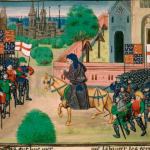 However, there was resistance to feudal rule and the power of the church throughout Europe. The 1324 uprisings took place not only in England, from where the quote comes, but also in Ypres and Bruges (Federici 2004: 34), and their demand was for a social position equal to that of the nobility. In Bremen, too, peasants refused to pay their taxes and were punished by the bishop in 1234 (ibid.: 34). In Florence in 1379, textile workers seized control of the city and set up a workers’ government which was defeated in 1382 (ibid.: 43). In most cases, insurgents did not limit themselves to demanding better working or living conditions, but aimed for the creation of a completely new social order (ibid.: 46).
However, there was resistance to feudal rule and the power of the church throughout Europe. The 1324 uprisings took place not only in England, from where the quote comes, but also in Ypres and Bruges (Federici 2004: 34), and their demand was for a social position equal to that of the nobility. In Bremen, too, peasants refused to pay their taxes and were punished by the bishop in 1234 (ibid.: 34). In Florence in 1379, textile workers seized control of the city and set up a workers’ government which was defeated in 1382 (ibid.: 43). In most cases, insurgents did not limit themselves to demanding better working or living conditions, but aimed for the creation of a completely new social order (ibid.: 46).
Further Reading:
*Silvia Federici (2004): Caliban and the Witch: Women, the Body and Primitive Accumulation. New York: Automedia.
OK
[There is] “no blanket prohibition” [against self-rule]. ‘I’m not opposed to it, but I want to do it in a way that takes care of our concerns. . . . Elections that are held too early can be destructive. It’s got to be done very carefully.’
Correct!
[There is] “no blanket prohibition” [against self-rule]. ‘I’m not opposed to it, but I want to do it in a way that takes care of our concerns. . . . Elections that are held too early can be destructive. It’s got to be done very carefully.’
Year:
Author Bio:
Paul Bremer (born 1941) was a US civilian administrator in Iraq employed by the US government from 2003-2004.
Source:
Washington Post (28.06.2003): Occupation Forces Halting Elections Throughout Iraq.
Context:
 Bremer’s policy of delaying elections, together with the Americans’ authoritarian occupation strategy, led to an increase in violence between religious groups and violent interpretations of religion (Klein 2010: 508). From the spring of 2004 onwards, the number of violent incidents rose steadily (Klein 2010: 489). With its policy of “regime change”, support of military and other coups throughout the 20th century, the USA as a hegemonic force distinguished itself from Great Britain’s hegemonic policies which had followed classic colonial power.
Bremer’s policy of delaying elections, together with the Americans’ authoritarian occupation strategy, led to an increase in violence between religious groups and violent interpretations of religion (Klein 2010: 508). From the spring of 2004 onwards, the number of violent incidents rose steadily (Klein 2010: 489). With its policy of “regime change”, support of military and other coups throughout the 20th century, the USA as a hegemonic force distinguished itself from Great Britain’s hegemonic policies which had followed classic colonial power.
Further Reading:
*Naomi Klein (2007): The Shock Doctrine. The Rise of Disaster Capitalism. Toronto: Knopf Canada.
OK
The mineral wealth beneath the soil, the banks and monopoly industry shall be transferred to the ownership of the people as a whole; (…) The Land Shall Be Shared Among Those Who Work It!
Men and women of all races shall receive equal pay for equal work; There shall be a forty-hour working week (…) Education shall be free, compulsory, universal and equal for all children;
Correct!
The mineral wealth beneath the soil, the banks and monopoly industry shall be transferred to the ownership of the people as a whole; (…) The Land Shall Be Shared Among Those Who Work It!
Men and women of all races shall receive equal pay for equal work; There shall be a forty-hour working week (…) Education shall be free, compulsory, universal and equal for all children;
Year:
Author Bio:
Freedom charter created by the African National Congress (ANC), through a process in which 50,000 volunteers in the townships collected important freedom demands of the people. The demands written on individual pieces of paper were then summarised and ratified in 1955 at a congress which 3000 delegates attended.
Source:
ANC (1955): The Freedom Charter.
Context:
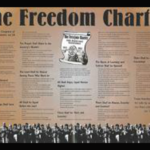 In South Africa, the white minority ruled over the Black majority during the apartheid regime from the beginning of the 20th century (especially after 1948) until 1994. Former ANC resistance fighter Nelson Mandela became the country’s first Black president in 1994. Within apartheid, a distinction was made between White, Coloured, Asian or Indian and Native, each of which had different rights. The ANC was founded as early as 1912, and with the “Defiance Campaign” against the laws of the apartheid regime from 1952-1954, it became a mass organisation of resistance.
In South Africa, the white minority ruled over the Black majority during the apartheid regime from the beginning of the 20th century (especially after 1948) until 1994. Former ANC resistance fighter Nelson Mandela became the country’s first Black president in 1994. Within apartheid, a distinction was made between White, Coloured, Asian or Indian and Native, each of which had different rights. The ANC was founded as early as 1912, and with the “Defiance Campaign” against the laws of the apartheid regime from 1952-1954, it became a mass organisation of resistance.
Further Reading:
*Naomi Klein (2007): The Shock Doctrine. The Rise of Disaster Capitalism. Toronto: Knopf Canada.
OK
Cesare Borgia was considered cruel; notwithstanding, his cruelty reconciled the Romagna, unified it, and restored it to peace and loyalty (…) Upon this a question arises: whether it be better to be loved than feared or feared than loved? It may be answered that one should wish to be both, but, because it is difficult to unite them in one person, is much safer to be feared than loved, when, of the two, either must be dispensed with.
Correct!
Cesare Borgia was considered cruel; notwithstanding, his cruelty reconciled the Romagna, unified it, and restored it to peace and loyalty (…) Upon this a question arises: whether it be better to be loved than feared or feared than loved? It may be answered that one should wish to be both, but, because it is difficult to unite them in one person, is much safer to be feared than loved, when, of the two, either must be dispensed with.
Year:
Author Bio:
Niccolò Machiavelli (1469-1527) was a philosopher and politician from Florence. In this piece of writing, he advocated for authoritarian power politics.
Source:
Niccolò Machiavelli (2016, Original 1513): The Prince, Chapter XVII. Ontario: Devolted Publishing, p. 40
Context:
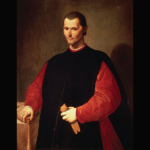 Machiavelli had a strong influence on state philosophy and still represents an authoritarian and ruthless idea of rule. This was based on his image of man: “Because this is to be asserted in general of men, that they are ungrateful, fickle, false, cowardly, covetous, and as long as you succeed they are yours entirely; they will offer you their blood, property, life and children, as is said above, when the need is far distant; but when it approaches they turn against you.” (ibid.) Even during his lifetime, Machiavelli was strongly criticised for his authoritarian ideas on state leadership, for example by the English cardinal Reginald Pole (1500-1558). Nevertheless, centuries later, this power politics was still a model for colonisers and warring parties; an example are the retaliatory measures taken by the National Socialists against resistance fighters during World War II.
Machiavelli had a strong influence on state philosophy and still represents an authoritarian and ruthless idea of rule. This was based on his image of man: “Because this is to be asserted in general of men, that they are ungrateful, fickle, false, cowardly, covetous, and as long as you succeed they are yours entirely; they will offer you their blood, property, life and children, as is said above, when the need is far distant; but when it approaches they turn against you.” (ibid.) Even during his lifetime, Machiavelli was strongly criticised for his authoritarian ideas on state leadership, for example by the English cardinal Reginald Pole (1500-1558). Nevertheless, centuries later, this power politics was still a model for colonisers and warring parties; an example are the retaliatory measures taken by the National Socialists against resistance fighters during World War II.
Further Reading:
The Guardian (Erica Brenner), 03.03.2017: Have we got Machiavelli all wrong?
OK
No government in the world would have tolerated having the main square of its capital occupied for eight weeks by tens of thousands of demonstrators who blocked the authorities from approaching the area in front of the main government building. (…) A crackdown was therefore inevitable. But its brutality was shocking (…)
Correct!
No government in the world would have tolerated having the main square of its capital occupied for eight weeks by tens of thousands of demonstrators who blocked the authorities from approaching the area in front of the main government building. (…) A crackdown was therefore inevitable. But its brutality was shocking (…)
Year:
Author Bio:
Henry Kissinger (born 1923) is a Republican politician and has held many positions, including that of US Secretary of State. He has been internationally criticised for his involvement in numerous government overthrows and for supporting authoritarian regimes (Argentina, Chile, Indonesia/East Timor). In 1973, he received the Nobel Peace Prize. In 2013, an endowed professorship was set up at the University of Bonn in his honour at the initiative of the Federal Republic of Germany’s then Interior Minister de Maizière and Foreign Minister Westerwelle.
Source:
Henry Kissinger (1. August 1989): The Caricature of Deng as a Tyrant is Unfair. Washington Post.
Context:
 Former US Secretary of State Henry Kissinger was known for his support of authoritarian regimes around the world. He is accused, amongst other things, of being linked to the assassination of Salvador Allende in Chile in 1973 and the illegal bombing of Cambodian territory during the Vietnam War. In 1989, the pro-democracy movement in Beijing demonstrated in Tiananmen Square. The Chinese military brutally crushed protests, killing an estimated 2,000-7,000 and injuring 30,000. In the aftermath, 40,000 people were arrested and hundreds executed. According to Naomi Klein (2007: 185f.), referring to historian Maurice Meisner, China’s communist government cracked down hardest on factory workers. The liberal economic reforms in China in the 1980s (president Deng Xiaoping had taken advice from Milton Friedman, the neoliberal icon) did not produce the hoped-for political liberalisation.
Former US Secretary of State Henry Kissinger was known for his support of authoritarian regimes around the world. He is accused, amongst other things, of being linked to the assassination of Salvador Allende in Chile in 1973 and the illegal bombing of Cambodian territory during the Vietnam War. In 1989, the pro-democracy movement in Beijing demonstrated in Tiananmen Square. The Chinese military brutally crushed protests, killing an estimated 2,000-7,000 and injuring 30,000. In the aftermath, 40,000 people were arrested and hundreds executed. According to Naomi Klein (2007: 185f.), referring to historian Maurice Meisner, China’s communist government cracked down hardest on factory workers. The liberal economic reforms in China in the 1980s (president Deng Xiaoping had taken advice from Milton Friedman, the neoliberal icon) did not produce the hoped-for political liberalisation.
Further Reading:
*Democracy Now (11.08.2016): Declassified Documents Show Kissinger Role in Argentine Dirty War.
*Naomi Klein (2007): The Shock Doctrine. The Rise of Disaster Capitalism. Toronto: Knopf Canada.
OK
When the social body of the country has been contaminated by a disease that corrodes its entrails, it forms antibodies. These antibodies cannot be considered in the same way as microbes. As the government controls and destroys the guerrilla, the action of the antibody will disappear, as is already happening. It is only a natural reaction to a sick body.
Correct!
When the social body of the country has been contaminated by a disease that corrodes its entrails, it forms antibodies. These antibodies cannot be considered in the same way as microbes. As the government controls and destroys the guerrilla, the action of the antibody will disappear, as is already happening. It is only a natural reaction to a sick body.
Year:
Author Bio:
César Augusto Guzzetti (1925-1988) was foreign minister during the Argentine junta that took power in 1976. Although he survived being shot by left-wing guerrillas in May 1977, he had to leave his post.
Source:
Quoted by Naomi Klein (2007): The Shock Doctrine. The Rise of Disaster Capitalism. Toronto: Knopf Canada, p. 113
Context:
 Disease metaphors have been and still are frequently used in politics to refer to complicated social processes and to justify drastic political measures. The Nazi doctor Fritz Klein said ‘The Jew is an inflamed appendix in the body of mankind.’ The Khmer Rouge justified mass executions in Cambodia this way: ‘What is infected must be cut out’ (cf. Klein 2007: 114). Susan Sontag (1981) wrote that the use of disease metaphors such as cancer justifies strict measures and is “as such implicitly genocidal.”
Disease metaphors have been and still are frequently used in politics to refer to complicated social processes and to justify drastic political measures. The Nazi doctor Fritz Klein said ‘The Jew is an inflamed appendix in the body of mankind.’ The Khmer Rouge justified mass executions in Cambodia this way: ‘What is infected must be cut out’ (cf. Klein 2007: 114). Susan Sontag (1981) wrote that the use of disease metaphors such as cancer justifies strict measures and is “as such implicitly genocidal.”
Further Reading:
*Susan Sontag (1978): Illness as Metaphor. New York: Farrar, Straus & Giroux.
OK
For a long time we lived under the dictatorship of the Communists, but now we have found out that life under the dictatorship of business people is no better. They couldn’t care less about what country they are in.
Correct!
For a long time we lived under the dictatorship of the Communists, but now we have found out that life under the dictatorship of business people is no better. They couldn’t care less about what country they are in.
Year:
Author Bio:
Grigori Gorin (1940-2000) was a Russian-Jewish doctor, screenwriter, and novelist.
Source:
Boris Kagarlitsky (1994): Square Wheels: How Russian Democracy got Derailed. New York: Monthly Review Press, p. 191.
Context:
 Through the transformation processes of glasnost (public) and perestroika (reorganisation), Mikhail Gorbachev, President of the Soviet republics, attempted to orchestrate a democratic transition in the Soviet Union. However, since Russia was heavily indebted, it had to implement economic reforms in order to get credit. With the dissolution of the USSR, Russian President Boris Yeltsin deposed Gorbachev and ruled by special decree for a year during the economic crisis. Valuable state property was sold off. For example, 40% of the oil company which had annual sales of around US$ 190 billion (2006) was sold for US$ 88 million (Klein 2007: 232). In 1999, he handed power to Putin, whose first act was to guarantee Yeltsin immunity (ibid.: 237).
Through the transformation processes of glasnost (public) and perestroika (reorganisation), Mikhail Gorbachev, President of the Soviet republics, attempted to orchestrate a democratic transition in the Soviet Union. However, since Russia was heavily indebted, it had to implement economic reforms in order to get credit. With the dissolution of the USSR, Russian President Boris Yeltsin deposed Gorbachev and ruled by special decree for a year during the economic crisis. Valuable state property was sold off. For example, 40% of the oil company which had annual sales of around US$ 190 billion (2006) was sold for US$ 88 million (Klein 2007: 232). In 1999, he handed power to Putin, whose first act was to guarantee Yeltsin immunity (ibid.: 237).
Further Reading:
*Aris Chatzistefanou & Katerina Kitidi (2012): Katastroika. Documentary.
*Naomi Klein (2007): The Shock Doctrine. The Rise of Disaster Capitalism. Toronto: Knopf Canada.
OK
The line is continuous—those who took the land from the Indians continue to oppress us with their feudal structures. (…) Foreign monopolies impose crops on us, they impose chemicals that pollute our earth, impose technology and ideology. All this through the oligarchy which owns the land and controls the politics. But we must remember—the oligarchy is also controlled, by the very same monopolies, the very same Ford Motors, Monsanto, Philip Morris. It’s the structure we have to change. This is what I have come to denounce. That’s all.
Correct!
The line is continuous—those who took the land from the Indians continue to oppress us with their feudal structures. (…) Foreign monopolies impose crops on us, they impose chemicals that pollute our earth, impose technology and ideology. All this through the oligarchy which owns the land and controls the politics. But we must remember—the oligarchy is also controlled, by the very same monopolies, the very same Ford Motors, Monsanto, Philip Morris. It’s the structure we have to change. This is what I have come to denounce. That’s all.
Year:
Author Bio:
Sergio Tomasella, tobacco planter and general secretary of the Argentine Farmers’ Union, was tortured and imprisoned for five years during the junta (military dictatorship). This quote comes from his testimony post-dictatorship before the Argentine tribunal against impunity.
Source:
Quoted by Klein 2007: 127
Context:
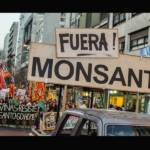 In this quote, Tomasella links colonialism with the inequality that goes hand in hand with unequal ownership. In Germany, too, 10% of the population owns 50% of the total net wealth. Income and wealth are related to people’s social backgrounds all over the world (70% of the children of academics go to university, while only 20% of the children of workersdo , see Fratzscher 2017).
In this quote, Tomasella links colonialism with the inequality that goes hand in hand with unequal ownership. In Germany, too, 10% of the population owns 50% of the total net wealth. Income and wealth are related to people’s social backgrounds all over the world (70% of the children of academics go to university, while only 20% of the children of workersdo , see Fratzscher 2017).
Further Reading:
*Naomi Klein (2007): The Shock Doctrine. The Rise of Disaster Capitalism. Toronto: Knopf Canada.
OK
We need a strategy of happiness, not of sacrifice. The left must visibly, clearly embody this strategy of happiness (…). You have to get away from the Spartan, life-averse attitude. I am very poor but I feel very rich. It’s not about destruction, it’s about overcoming what currently exists.
Correct!
We need a strategy of happiness, not of sacrifice. The left must visibly, clearly embody this strategy of happiness (…). You have to get away from the Spartan, life-averse attitude. I am very poor but I feel very rich. It’s not about destruction, it’s about overcoming what currently exists.
Year:
Author Bio:
Luis Rosadilla (b. 1953) was a guerrilla eith the Tupamaro in Uruguay during the military junta (1973-1985), and Minister of Defence under Pepe Mujica, who was also an ex-guerrilla.
Source:
From a letter to Lutz Taufer. Quoted in Taufer (2017): Über Grenzen. Vom Untergrund in die Favela. Berlin & Hamburg: Assoziation A, p. 178. The year (1988) is an approximation.
Context:
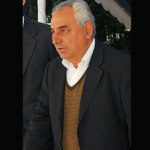 Questioning power also means thinking about alternatives. Creating something new is often more difficult than criticising what already exists. But in spite of difficult circumstances, people have always tried to make societies free, equal and just. And yet some alternatives were just as violent as the social models they aspired to overcome.
Questioning power also means thinking about alternatives. Creating something new is often more difficult than criticising what already exists. But in spite of difficult circumstances, people have always tried to make societies free, equal and just. And yet some alternatives were just as violent as the social models they aspired to overcome.
Many people have also died in the attempt to create a new social order. However, there are always experiments that inspire hope with their ideas of transforming systems of rule that have existed for centuries. This doesn’t always happen on a large scale, and often takes place through small projects. It can also involve whole regions; for example, the state of Chiapas in Mexico where the autonomous, democratic grassroots Zapatist@s live by the motto: ‘We advance by asking questions.’ The US historian Howard Zinn (2004) said: ‘To be hopeful (…) is by no means only foolishly romantic!’
Further Reading:
*John Holloway (2005): The Concept of Power and the Zapatistas.
*Howard Zinn (2004): The Optimism of Uncertainty.
OK
1500
to 1600
to 1700
to 1800
to 1850
to 1900
to 1925
to 1950
to 1975
to 1990
to 2000
to 2010
2011